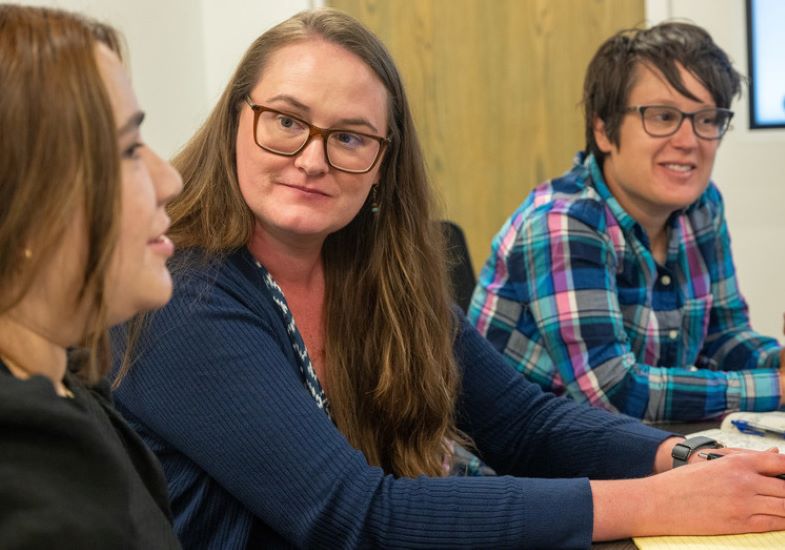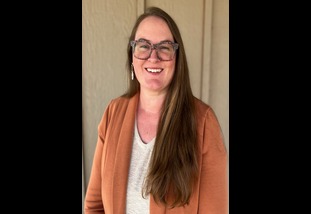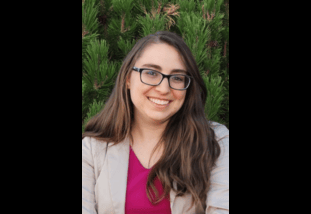PROGRAM OVERVIEW
All graduate students in Psychology and Law are expected to:
- Take the core courses:
- Research Methods
- Social Psychology
- Developmental Psychology
- Cognitive Psychology
- Biological Psychology
- Take 2 core statistics courses
- Your committee will likely recommend additional statistics courses
- Complete and defend a Master's thesis and Dissertation in some area of Psychology and Law
- Pass a qualifying exam, developed by the student in collaboration with your graduate committee
- Participate in the 1 credit Psychology/Law proseminar each semester
- Be active in the Psychology and Law Research Group
Psychology and Law Core Faculty:
Kayla Burd
Social cognitive processes in decision making
- Eyewitnesses
- Police Officers
- Jurors
Extra-legal biases on perception, memory, and reasoning
Police investigations and shooting decisions
Scott Freng
Social Psychology
- Social cognitive processes in juror decision making
- Investigating outcomes related to different forms of prejudice (e.g., sentencing disparities)

Hannah Phalen
Psychology and Law
- Race and Gender in the Legal System
- Visual Evisence
- Emotion and Legal Decision-Making
Sean McCrea
Social Psychology
- Social cognition
- Judgment and decision making
- Group identity
Ph.D.'s from our program. They are gone but not forgotten.
- Monica McCoy (Ph.D. 1997) Developmental Psychology, Dissertation "Jurors' reasoning skills and verdict decisions: The effect of jury deliberations." Currently a Professor and Chair of the Psychology Department at Converse College.
- Matt Dammeyer, (Ph.D. 1999) Clinical Psychology, Dissertation- "Self-reported levels of anxiety and depression among law students." Currently the Director of Behavioral Health at Central Peninsula General Hospital, Alaska
- Walt Peters, (Ph.D. 2000) Developmental Psychology, Dissertation- "Adult perceptions of child witnesses." Currently a Research Associate at Neilson in Australia.
- Kami London (Ph.D. 2001) Developmental Psychology, Dissertation "Investigative courtroom interviews of children: Examining the efficacy of Truth/Lie Discussions in increasing the veracity of children's reports." Currently an Associate Professor at the University of Toledo.
- Mindy Dahl (Ph.D. 2005) Developmental Psychology Dissertation- "Adolescent decisions in situations of uncertainty: The impact of risky choice framing and decision making competency." Currently a Health Science Policy Advisor at the National Institute of Mental Health.
- Connie Tang (Ph.D. 2005) Developmental Psychology- Dissertation "Young Children's Awareness of When New Learning Occurred." Currently an Associate Professor at Stockton College.
- Dana Binder (Ph.D. 2006) Social Psychology- Dissertation "The relationship between Need for Cognition, argument strength, and the persuasiveness of courtroom technology." Currently a Trial Consultant at Dispute Dynamics, Inc.
- Christine Shea Adams (Ph.D. 2007) Social Psychology- Dissertation "The Death Penalty Attitudes Scale: Can capital trial jurors be chosen more fairly?" Currently a Statistical Analyst at The Colorado Division of Criminal Justice.
- Jessica Hatz (Ph.D. 2007) Social Psychology - Dissertation "Do deceptive behaviors and lie detection abilities vary as a function of the method use for eliciting lies.'' Currently an Associate Professor at Austin Peay State, TN.
- Andre Kehn (Ph.D. 2010) Psychology and Law - Dissertation "The impact of social categorization on own-and other-race face processing." Currently an Associate Professor at the University of North Dakota.
- Jennifer Gray (Ph.D. 2012) Psychology and Law - Dissertation "The role of jurors' prior beliefs on the impact of expert testimony." Currently an Assistant Professor at Mt. Olive University.
- Stephannie Walker (Ph.D. 2013) Psychology and Law - Dissertation "Reinventing the mousetrap: Source misattribution among elderly as a result of imagination inflation and repeated questioning." Currently an Research Associate at Wake Medical School.
- Christopher Chai (Ph.D. 2014) Psychology and Law - Dissertation "The impact of stereotypical Asian crimes on juror decision-making: Punishing the model minority". Research Associate at the National Institute for Mental Health.
- Kimberly Schweitzer (Ph.D. 2016) Psychology and Law Dissertation- Does DNA evidence trump all other evidence? An examination of the effects of common homicide trial evidence and mock jurors’ verdicts. Currently an Assistant Professor in Criminal Justice at the University of Wyoming
- Victoria Estrada-Reynolds (Ph.D. 2017). I don't not like them: Positive and negative attitudes among racial minority and majority groups predicting support for immigration policy. Currently an Assistant Professor at Stockton College.








